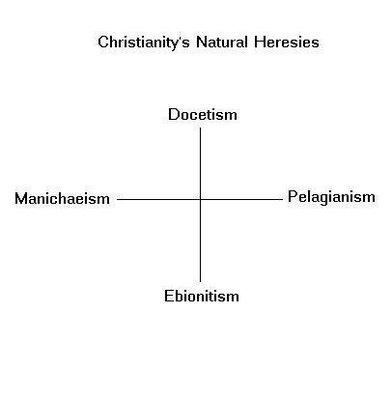Heresies do not arises out of nothing. By definition they latch on to some aspect of the truth. They have some organic or natural connection to Christian doctrine. By analyzing a heretical claim, we can identify this core of truth. After performing such an analysis on opposing heresies, we can synthesize the insights into a greater whole. Thus the heart of Christian doctrine can be displayed in relationship to its natural heresies.
In pursuing this task, it is particularly helpful that most classical heresies have an opposing counterpart. For instance, in the earliest centuries of the church, emerging Christology naturally leaned in one of two directions: either toward Docetism (the notion that Christ was divine being who only appeared to be human) or toward Ebionitism (the notion that Christ was a only a human being). The fully developed Christian claim is found in the space between these two extremes: that Christ is both divine and human.

The procedure of finding the truth between the extremes is not limited to the inherently paradoxical domain of Christology. The same program yields insights in the realm of Christian anthropology. As the early Christians began to think about humanity which is saved by Christ, two natural tendencies emerged. On the one hand, humanity might be regarded as so sinful that it is irredeemable, such that salvation is understood as an escape from human life. This perspective was advanced by many gnostic groups, but most sharply by Manichaeans. On the other hand, humans might be regarded as so ready for salvation that they essential save themselves. This perspective was advanced most famously by the Pelagians (although Pelagius himself may have been more subtle, Pelagianism has become the "name brand" for this heretical viewpoint). Once again, the fully developed Christian claim is found in the space between these two extremes: that humanity is utterly sinful yet grace is powerful enough to overcome sin and redeem humanity.

By combining the insights drawn from both sets of extremes, we can paint a pretty good picture of the heart of the Christian faith in counterpoint to its natural heresies. Christians affirm Jesus Christ as the fully divine and fully human savior of humanity from its sin. According to this procedure, orthodoxy is not achieved by rejecting a long list of heresies. Rather, Christian faith is best expressed in the space between its natural heresies, as the whole truth God which reconciles such oppositions.

This diagram is of course just one possible way of expressing the complexities of Christian belief by means of a study of its natural heresies. This particular one was made famous by F. D. E. Schleiermacher in the introduction to his great work, The Christian Faith. By drawing on such a controversial modern theologian, this post intends to embody the very spirit it promotes: that we can learn from any Christian who takes the time to articulate affirmations about divine things.
Any thoughts?
Does this diagram illuminate how heresy can be used to gain deeper understanding of the faith?
What are some other natural heresies of Christianity?
Are there any heresies that do not come in such neat pairs?
Does such a procedure really work in the midst of a heretical controversy, or is it only possible as an after-the-fact reflection?


3 comments:
Hi, Im from Melbourne Australia.
Have you ever considered that Christianity altogether IS a heresy? It is only and entirely a religion about Jesus!
Please check out:
1. www.dabase.net/proofch6.htm#idol
You've got me thinking now about "parties" and "denominations" and how the various denominations/parties may aid the whole body in understanding truth...
And... it alerts me to use new theological emphases (Emerging thinking, open Theism etc.) as a corrective or balancing weight to present-past thinking.... thanks!
Very glad to have found this site - I found this analysis stimulating. Of course, "in the moment" this analysis could be seen as an argument for moderation! That might not help us if history is being made as much as it does when we look back at history already made...
Sometimes the middle path is wrong and the prophetic (lone?) voice is right.
Thanks for the great thoughts.
Post a Comment